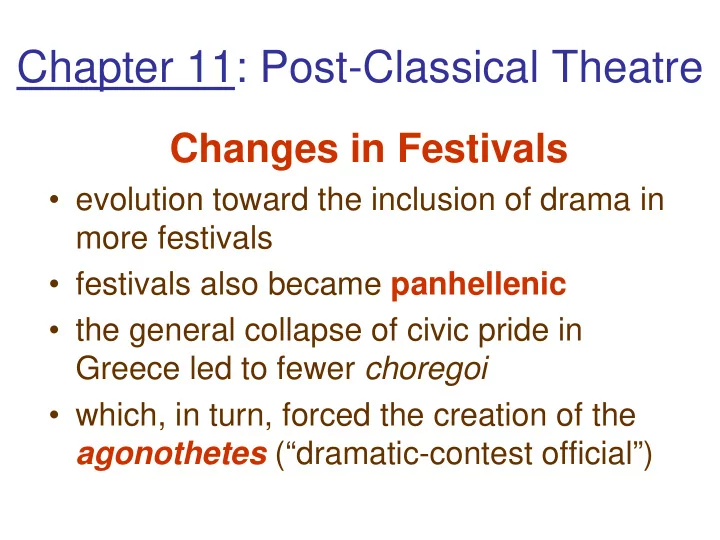

Chapter 11: Post-Classical Theatre Changes in Festivals • evolution toward the inclusion of drama in more festivals • festivals also became panhellenic • the general collapse of civic pride in Greece led to fewer choregoi • which, in turn, forced the creation of the agonothetes (“dramatic-contest official”)
Chapter 11: Post-Classical Theatre Changes in Actors and Acting • the rise of mega-stars like Polus – very popular around the known world! • also, the formation of The Artists of Dionysus , a union overseeing the interests of theatre professionals – especially those who went on tour – n.b. the usefulness of the three-actor rule and embolima to touring actors
Chapter 11: Post-Classical Theatre Changes in Drama • Was exposition added to the dramas to make them more comprehensible to the ever increasing influx of foreign viewers? – that is, do the texts of tragedies, as we have them, stem in any significant way from scripts written down in the Post-Classical Age? – unlikely! Given the variability of myth, the classical tragedians would have needed to supply exposition, especially for foreigners
Chapter 11: Post-Classical Theatre Changes in Drama • nevertheless there are clear interpolations inserted by later hands into the texts of classical dramas as we have them – e.g. Antigone 905-915
Chapter 11: Post-Classical Theatre Changes in Theatre • new technical devices – bronteion : thunder – keraunoskopeion : lightning – “Charon’s steps ”: dead rising from tombs • many different types of theatres – some are larger than the Theatre of Dionysus (Ephesus) – others are smaller (Delphi)
Chapter 11: Post-Classical Theatre The Theatre of Ephesus
Chapter 11: Post-Classical Theatre The Theatre of Ephesus
Chapter 11: Post-Classical Theatre The Theatre of Ephesus
Chapter 11: Post-Classical Theatre The Theatre of Ephesus
Chapter 11: Post-Classical Theatre The Theatre of Delphi
Chapter 11: Post-Classical Theatre Mime • a low-brow form of entertainment – not popular during the Classical Age, even though it is attested that far back – nor even during the Post-Classical Age • rose to prominence in the Roman period
Chapter 11: Post-Classical Theatre Mime • highly variable in form and tone – mostly raucous, indecorous, full of slapstick – but later mime could be philosophical • and may not even have been performed • only one principal performer ( archimime ) – who played all the speaking parts! • mime was what the early Christian fathers despised and protested against so much
Chapter 11: Post-Classical Theatre Mime
Chapter 11: Post-Classical Theatre Mime • no mimes have been carried through a literary tradition (duh!) • but six Mimiambi by Hero(n)das have turned up on an Egyptian papyrus – all are vulgar; some even obscene • cf. the Oxyrhynchus Mime (“The Adulteress”)
Chapter 11: Post-Classical Theatre Conclusion: Classical Drama • note how quickly the evolution of drama took place – from invention to the sit-com, in 300 years! • the number of “geniuses” who appear: – "Thespis," Phrynichus, Aeschylus, Sophocles, Euripides, Cratinus, Eupolis, Aristophanes, Alexis, Philemon, Diphilus, Menander, etc. – even Renaissance Italy can’t match this!
Chapter 11: Post-Classical Theatre Conclusion: Classical Drama • no new technical advances until the advent of electricity
Chapter 11: Post-Classical Theatre Conclusion: Classical Drama • moreover, there have been no new dramatic techniques invented at all! – costuming, dialogue, masks, prologues, irony, epilogues, tech crews, disguises, actors' unions, character-types, scenery, pampered stars, farce, love triangles, flying around the stage on ropes, hit musicals, censored plays, touring shows, . . . – and if you add mime: nudity and sex, too!
Chapter 11: Post-Classical Theatre Conclusion: Classical Drama • but don’t be depressed! • we don’t have to be better than the Greeks, because we are the Greeks! – just Greeks arriving at the party a little late – and speaking Latin with a German accent! • the Greeks are our ancestors, too, and we today own them as much as anyone else • speaking of Latin, next up is Rome!
Recommend
More recommend